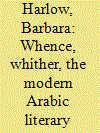|
|
|
Sort Order |
|
|
|
Items / Page
|
|
|
|
|
|
|
| Srl | Item |
| 1 |
ID:
165178


|
|
|
|
|
| Summary/Abstract |
This article examines three museums that address Lebanon’s history of conflict: the newly opened Beit Beirut on the capital’s former Green Line, the Hezbollah-run Mleeta Resistance Tourist Landmark in south Lebanon, and Umam Documentation and Research’s online archive “Memory at Work.” Each testing the parameters of what the term museum can mean in Lebanon today, these cases highlight the still-contested nature of war narratives. While many Lebanese youth express desire for a shared national history of the civil war, the affective complexities of recuperated memorial sites and the inconsistent involvement of the state suggest that the possibility of publicly staging such a history is far from secure.
|
|
|
|
|
|
|
|
|
|
|
|
|
|
|
|
| 2 |
ID:
131552


|
|
|
|
|
| Publication |
2014.
|
| Summary/Abstract |
Postwar Lebanon, Sufism, imperial translations, Hamlet, trials and atlases, city streets, literary cafés, and Tahrir Square: disorienting as these various themes might appear to be, they nonetheless entitle eight recent inquiries into contemporary-and precedent-directions of literary critical studies of the modern Arabic novel and their calculated revisions of, perhaps, another Arabic literary historical narrative that necessarily engages multigenre, comparative literary-historical investigations. Each of the works under review here was published between 2010 and 2013, with just one specifically, and that ex post facto, addressing the momentous events in Cairo's Tahrir Square in the early months of 2011. In other words, these works might well have already anticipated a more than seasonal, some would even argue historic, "Arab spring," and at least several of the works' authors found it necessary to append an epilogue to their in-production text, or otherwise slightly, subtly, revise at the last minute their presumptive chronologies and the contested trajectories of modern Arabic literature that attend them. From the classically proverbial "tradition versus modernity" discussions through their historicist implications for the cultural production of new media and alternative public spheres, each of these studies seeks, in its own way/s, to instantiate Arabic literature-and Arabic literary criticism-within and against its respected precursors. But where will that self-same literature, and its current critical mediations, eventually wind up, whether globally, nationally, or historically?
|
|
|
|
|
|
|
|
|
|
|
|
|
|
|
|
|
|
|
|
|